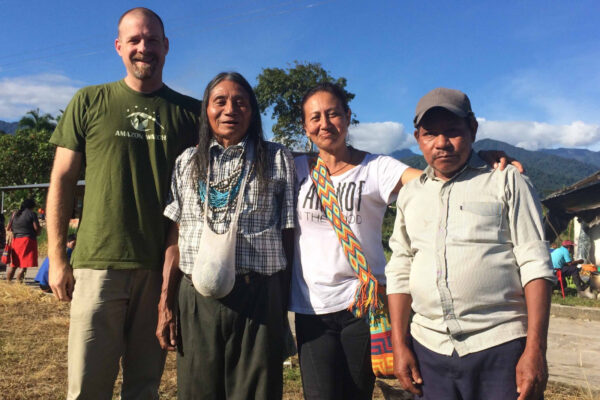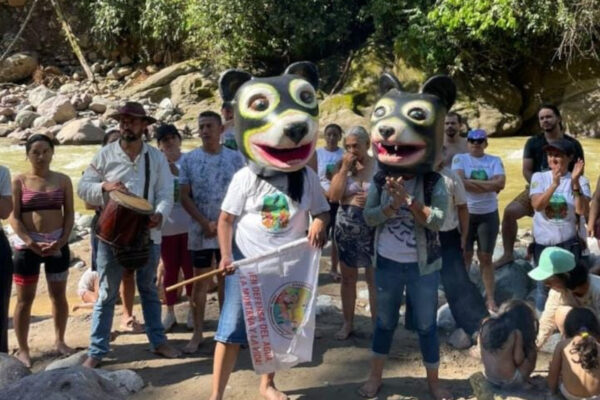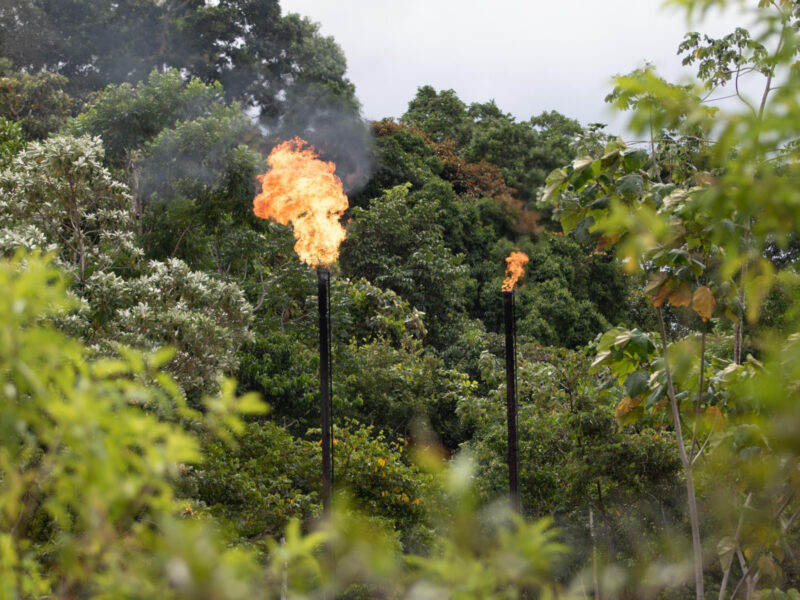The threats came first as rumors; strange people commented that they were going to kill us. Then text messages. Images of mutilated bodies began to arrive, saying that this could happen to us if we continued to denounce the impacts of drug trafficking and monocultures in our territories. At first, we didn’t take it so seriously. But everything changed on April 12, 2020, when the first Kakataibo leader was murdered.
Arbildo Meléndez was a very strong leader in Unipakayaku, a community invaded by coca growers, which continues to demand its communal land title. He had denounced the threats he was receiving from drug traffickers to the United Nations human rights rapporteur. Two weeks later, he was murdered on his farm. After that, we knew that anything could happen. Since 2021, we have been displaced from our communities.
We had to leave our farms. In Flor de Ucayali, Miguel grows pineapple, bananas, and cocoa. His community is committed to ancestral agriculture, in balance with nature. Now, we live in polluted, noisy cities with unhealthy food. But the worst thing is that it feels as if we have lost the roots of our struggle. In the community, we fought as a collective. Now, being outside of our communities, we must advocate as individuals.
Even so, we decided to insist on our denunciation, since our common home is in a state of emergency. Apart from the strongest fires we have experienced, we are seeing a growth and convergence of illegal mining, cocaine production, illegal logging, and other illicit activities around the Amazon. Criminal economies deforest the rainforest, pollute our rivers, dispossess our ancestral territories, recruit our children, and damage our health. They even endanger the lives of our brothers and sisters who live in isolation, as is the case of part of the Kakataibo people, whose reserves that are intended to protect them have instead been spent to install airstrips, laboratories and clandestine roads.
The largest and most biodiverse rainforest in the world has become the most dangerous for those of us who protect it. The Interethnic Association for the Development of the Peruvian Rainforest (AIDESEP) has recorded the murder of 36 Amazonian Indigenous leaders in Peru since 2014. Eighty percent of these happened in the last four years, demonstrating evidence of escalating violence. In each case, there were months or even years of prior threats and denunciations. However, there was no government action to prevent the violence. In turn, there are more than 200 Amazonian leaders currently under threat, and hundreds of communities invaded or besieged by criminal economies.
Despite our denunciations, we see that public policies fail to protect our rights and territories. There is impunity and lack of access to justice. We see that corruption allows criminal groups to take over even local government structures. In this way, today criminal economies have become one of the main threats to our ability to respond to the climate crisis, by directly affecting the territories of greatest biodiversity and Indigenous self-determination.
In the absence of government intervention and limited international action, Indigenous communities have no choice but to resort to increasingly dangerous forms of self-defense. Kakataibo, Ashaninka, and Shipibo-Konibo Indigenous guards have confronted drug trafficking, monitor their territories, and have denounced illegal land trafficking. The Wampis Autonomous Territorial Government guard patrols their rivers, expels illegal miners, disarms illegal gold mining operations, and has even arrested police officers involved in the illegal gold business, handing them over to the authorities.
Protecting the Amazon and its Indigenous territories requires strengthening territorial governance through collective titling, government support, and self-protection systems. Governments must guarantee our ancestral land rights, protect land defenders, and promote health, education, and sustainable economies. At the international level, greater cooperation is key to address environmental crimes, with the participation of Indigenous peoples, as determined by ILO Convention 169 and the U.N. Declaration on the Rights of Indigenous Peoples. In addition, measures are needed to prohibit toxic and polluting substances associated with illegal activities such as mining and drug trafficking, as well as regional security strategies based on cooperation and the fight against corruption.
We are running out of time. It is time to act for our collective survival, as we Indigenous peoples are doing. See you in Cali for a party.
Miguel Guimaraes Vasquez is vice-president of AIDESEP and Herlín Odicio Estrella is vice-president of ORAU














